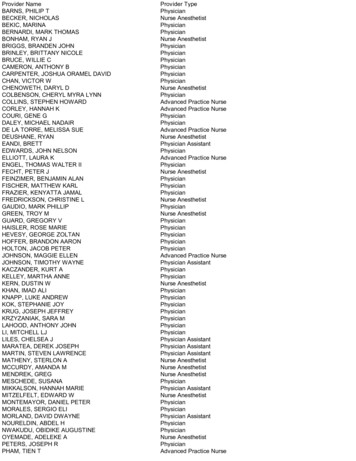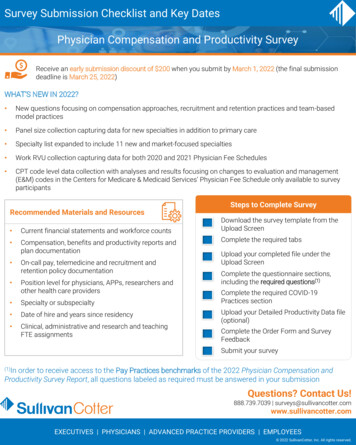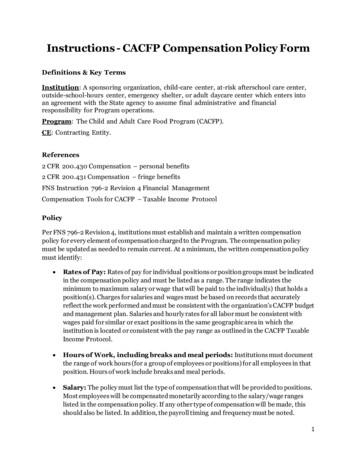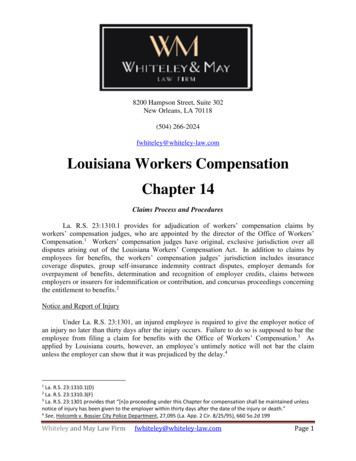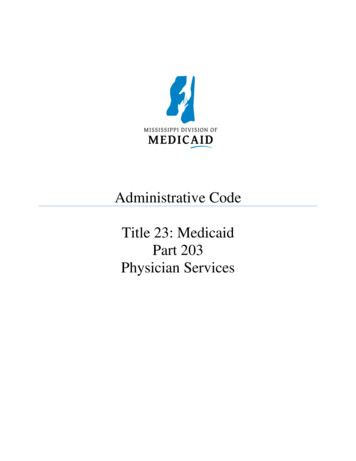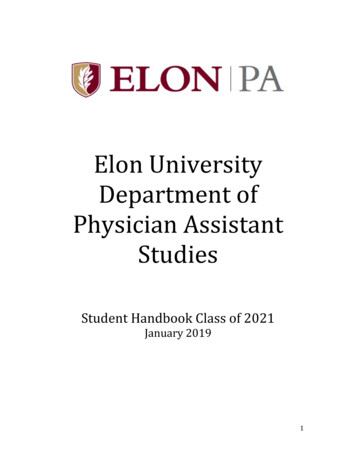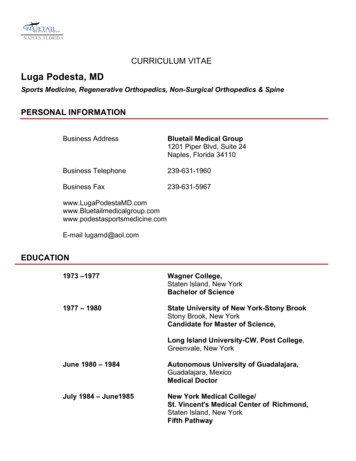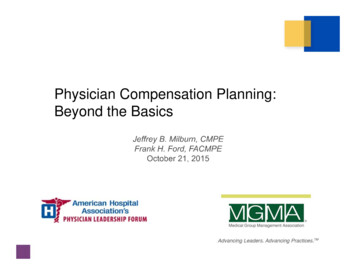
Transcription
Physician Compensation Planning:Beyond the BasicsCopyright 2014. Medical Group Management Association (MGMA ). All rights reserved.
Agenda Introductions/Learning Objectives Compensation Plan Development Process– Compensation Planning Step 1: Start Up Step 2: Compensation Plan Options and Selection– Base– Incentives– Other Compensation Concerns Step 3: Plan Approval Step 4: Implementation Summary Questions Tools and Reference MaterialsCopyright 2014. Medical Group Management Association (MGMA ). All rights reserved.2
Speaker Introductions Frank H. Ford, MBA, MHS, FACMPE– Over 30 years executive and consulting experience in practicemanagement for integrated delivery systems and medicalpractices Jeffrey B. Milburn, MBA, CMPE– Over 35 years of medical practice management and consultingexperience– Contributing author to RVUs: Applications for Medical Practices2nd Edition– Co-author of Strategies for Value Based PhysicianCompensation Consultants with MGMA Healthcare Consulting GroupCopyright 2014. Medical Group Management Association (MGMA ). All rights reserved.3
Objectives Describe the process of developing and evaluating aphysician compensation plan Identify the various value-based incentive options andthe selection and implementation processes List the steps necessary for approving and implementinga new compensation plan Provide tools for use in developing a model for yourorganizationCopyright 2014. Medical Group Management Association (MGMA ). All rights reserved.4
Compensation Plan ProcessStep 1: Start UpCopyright 2014. Medical Group Management Association (MGMA ). All rights reserved.5
Start Up Why are you considering changing compensationmodels? Compensation Plan Committee Establish goals and objectives Timing expectations Potential pitfalls Consultant’s potential responsibilities in compensationplanningCopyright 2014. Medical Group Management Association (MGMA ). All rights reserved.6
Why are you considering changingyour compensation plan? External environment (P4P, ACO’s, etc.) Recruit and retain issues– New reimbursement models Internal environment––––Alignment of compensation with productionDistributions considered not “fair”Not aligned with cultureChanging dynamics (new MD’s don’t want partnership, part timephysicians, etc.) Merger/Acquisition/Joining IDS or ACOCopyright 2014. Medical Group Management Association (MGMA ). All rights reserved.7
Compensation Committee Make Up:– Size and Representation– Schedule– Permanent and ad hocmembers Responsibilities:Copyright 2014. Medical Group Management Association (MGMA ). All rights reserved.– Establish goals andobjectives– Individual physicianinterviews– Identify and model options– Select preferred option– Educate stakeholders– Obtain approval
Establish Goals and Objectives The Goals and Objectives of the plan will drive whichplan is best suited to your practice– Alignment with group culture– Alignment with Mission and Goals There is NO PERFECT PLAN, only the best plan toachieve the results the group wantsCopyright 2014. Medical Group Management Association (MGMA ). All rights reserved.9
Establish Goals and Objectives(continued) Data/Document review Leadership/physician interviews What works, what doesn’t work, what needs to changewhat are deal breakers Prepare plan goals statement Compensation Committee review and approve goalsstatement Distribute to physicians to introduce project and setobjectivesCopyright 2014. Medical Group Management Association (MGMA ). All rights reserved.10
Timing Expectations The amount of time it takes to develop a compensationplan can vary significantly based on many factors– Organizational structure (Integrated Delivery System (IDS) orgroup practice).– Number of physicians involved– Number of specialties involved– Types of specialties (outpatient, inpatient, surgical)Copyright 2014. Medical Group Management Association (MGMA ). All rights reserved.11
Timing Expectations (continued) Typical time for each step:––––Step 1:Step 2:Step 3:Step 4:1-3 months (project start up)2-6 months (plan options and selection)1-3 months (plan approval)1-? Months (implementation) Other Considerations– Best time of year to start/implement– Implement all at once or phase inCopyright 2014. Medical Group Management Association (MGMA ). All rights reserved.12
Potential Pitfalls for Administrator Situations that put administrator’s job at risk:– Changing Compensation Model– Mergers and Acquisitions– Changing Information Systems Potential areas of conflict––––Politics (how full is your bucket?)Blame after the factAppearance of “playing favorites”Trust/lack thereofWhere Angels Fearto Tread Consultants can help diffuse the riskCopyright 2014. Medical Group Management Association (MGMA ). All rights reserved.13
Consultant’s potential responsibilitiesin compensation planning Identify the current compensation plan’s strengths andweaknesses Benchmark current and proposed plans against marketand peer group performance Develop alternative structures and measurement metrics Lead formal presentation, and Facilitate decision makingSource: Medical Group Management Association, 2014. Strategies for Value-Based Physician Compensation.Copyright 2014. Medical Group Management Association (MGMA ). All rights reserved.14
Compensation Plan ProcessStep 2: Identifyoptions and selectpreferred modelCopyright 2014. Medical Group Management Association (MGMA ). All rights reserved.15
Identify options (Basic planstructures), including current plan Base (80-100%)– Salary– Production Incentives (0-20%)– Quality– Citizenship Other additional compensation– Administrative Pay– NPP Supervision Incentives should not exceed 10% in first iterationCopyright 2014. Medical Group Management Association (MGMA ). All rights reserved.16
Base Compensation Salary–––––Initial guarantee for transitionStraight salarySalary with production incentiveHow are they adjustedShift Rates Time off (vacation, CME, holidays) adjustmentCopyright 2014. Medical Group Management Association (MGMA ). All rights reserved.17
Base Compensation Production– Including underlying base salary or not?– Establishing Draw– What is /wRVU based on Survey Data Net Income Ancillary income?– “Dummy Codes”– Specific Surgery and OB/GYN challengesCopyright 2014. Medical Group Management Association (MGMA ). All rights reserved.18
Non-Productivity IncentivesCopyright 2014. Medical Group Management Association (MGMA ). All rights reserved.19
Compensation PlansIncentive Component Trends Part of Primary Compensation Plan– Private Practice 5% to 10%– IDS 10% to 20% Pay for Performance (P4P or 4P) Value Cost Quality– Reduce cost– Increase quality– Cost of improving quality Replace Fee for Service (FFS) ?Copyright 2014. Medical Group Management Association (MGMA ). All rights reserved.20
IncentivesIncentive Factors – Goals Goals and Objectives––––––Improve qualityReduce costs – practice and/or payerChange individual behaviorMeet and participate with payer initiativesOrganizational strategic initiativesIndividual & practice - culture changeCopyright 2014. Medical Group Management Association (MGMA ). All rights reserved.
IncentivesIncentive Factors – Funding Source of Funds– Internal Private practice Integrated delivery system– External Government programs Payer programs– Additive– WithholdCopyright 2014. Medical Group Management Association (MGMA ). All rights reserved.22
IncentivesIncentive Measures Generally measurable (objective)– Examples – clinical quality, utilization, panel size Behavior measurements (subjective)– Based on opinions and observations – supportable?– Examples – patient and peer satisfaction surveys Data–––––Source – trustworthy?AccuracyAcceptable to physicians – solicit inputUnderstandable – report methodologyFrequency – status feedbackCopyright 2014. Medical Group Management Association (MGMA ). All rights reserved.23
IncentivesTargets and Rewards Targets–––––Emphasize objective over subjectiveReasonable and attainableAlign with strategic initiativesMultipleFlexible – periodic review and recalibration Rewards––––Allocation – individual and groupMeaningfulFrequentCash and other options – additional benefitsCopyright 2014. Medical Group Management Association (MGMA ). All rights reserved.24
IncentivesPhysician ConcernsPhysicians support concept of Quality care and outcomes Coordination of care Lower costs but worry about their compensation “Fair” compensationMeet personal expensesQuality and value not always easy to define or measureFFS is usually a direct line to productivity - understandableCopyright 2014. Medical Group Management Association (MGMA ). All rights reserved.25
Concerns Different payers different metrics confusionMultiple comp plans in organizationPatient compliancePatient acuityPatient attributionComp plan complexity – forget KISSRisk management – capitationRisk allocationCopyright 2014. Medical Group Management Association (MGMA ). All rights reserved.26
Impact on MD Compensation Identify and assess plan component cash flows Start up costs Ongoing costs Timing of expenses and revenue Allocation of right 2014. Medical Group Management Association (MGMA ). All rights reserved.
Implementation Understand the ––––Source of fundsScope of servicesPhysician motivation opportunitiesRisk and reward potential Data is critical– Internal and external Build from P4P Evaluation and evolution– Start slow and buildCopyright 2014. Medical Group Management Association (MGMA ). All rights reserved.28
Incentive Mix and Phase 5%Citizenship25%20%20%15%Clinical A010%20%10%Clinical B010%20%20%Clinical C010%20%10%Clinical D00030%100%100%100%100%TotalCopyright 2014. Medical Group Management Association (MGMA ). All rights reserved.29
Compensation Model OptionsCopyright 2014. Medical Group Management Association (MGMA ). All rights reserved.30
IncentivesFinal Points Physicians are critical to the process P4P methodology will support transition Move from an individual to a group culture FFS isn’t going away quickly Payer or source of funds will drive compensationmethodology Continuous evaluation and evolution Value will be defined at various levels from individual topracticeCopyright 2014. Medical Group Management Association (MGMA ). All rights reserved.31
Other ConsiderationsCopyright 2014. Medical Group Management Association (MGMA ). All rights reserved.32
Other Compensation Considerations Ancillary RevenueLegacy/special dealsLow volume, strategically important specialtiesOne model for all, or a model with multiple componentsNew physiciansPart-time physiciansBy specialtyRetiring physiciansPhysician Administrative positionsNon-physician practitioner supervisionCopyright 2014. Medical Group Management Association (MGMA ). All rights reserved.33
Survey Data Options Typical survey sources for benchmarking physiciancompensation and production:– Medical Group Management Association– American Medical Group Association– Sullivan Cotter and Associates Differences––––Number of respondentsSize of groupsDetail levelFocus Using multiple sourcesCopyright 2014. Medical Group Management Association (MGMA ). All rights reserved.34
Evaluation of preferred plan optionsNow that you’ve identified potential compensationmodel(s), they need to be tested with actual data. Financial impact on group/fiscal responsibility Effect on various specialties Individual impact (positive or negative) Review against goals and objectives Potential adverse impact/unintended consequencesCopyright 2014. Medical Group Management Association (MGMA ). All rights reserved.35
Compensation Plan ProcessStep 3: Approval ProcessCopyright 2014. Medical Group Management Association (MGMA ). All rights reserved.36
Approval ProcessProduction of Compensation PlanDocumentFair Market Value OpinionPresentation of preferred modeland modify based on commentsBoard or Partner ApprovalCopyright 2014. Medical Group Management Association (MGMA ). All rights reserved.37
Production of Compensation PlanDocumentThe new compensation plan should be documented incomplete detail How to calculate the initial salaries, rates per wRVU,incentives and goals How the above will be modified over time and on whatschedule How are adjustments made for part-time physicians Compensation for additional duties (administrativecompensation, NPP’s, etc.) and how adjusted in thefuture. Methodology for changes to the plan (requirements toamend contracts?)Copyright 2014. Medical Group Management Association (MGMA ). All rights reserved.38
Fair Market Value Review Third party Fair Market Value review/opinion required forall not-for-profit entities Provides protection for the organization and executivesrelated to Stark and Fraud and Abuse regulations Health systems’ and hospitals’ tax exempt status andMedicare participation are at risk Paying physicians and others above fair market valuecan be considered “Private Inurement”Copyright 2014. Medical Group Management Association (MGMA ). All rights reserved.39
Presentation of preferred model andmodify based on commentsAfter Fair Market Review completed, proceed through theprocess required by the organization’s bylaws, policies orphysician agreements. Typical steps include: Compensation Committee Physician Group Board of Directors (physician group or IDS) Final approval by physician owners (if private group andrequired by by-laws)Copyright 2014. Medical Group Management Association (MGMA ). All rights reserved.40
Compensation Plan ProcessStep 4: ImplementationCopyright 2014. Medical Group Management Association (MGMA ). All rights reserved.41
ImplementationContract PreparationIndividual Physician MeetingsContract DistributionTiming ConsiderationsCopyright 2014. Medical Group Management Association (MGMA ). All rights reserved.42
Preparation of Physician Agreements Good time to get all physicians on one standard contract Compensation Exhibit needs to clearly state the model,but not be overly specific beyond Stark requirements. Address changes in wRVU calculation methodology byCMS Enable changes to compensation plan incentive goalswithout amending the agreementCopyright 2014. Medical Group Management Association (MGMA ). All rights reserved.43
Individual Physician Meetings Review physician specificprojections Review contract languagesand any changes otherthan compensation What original deals will you“grandfather” in the newagreement (e.g. noncompete)?Copyright 2014. Medical Group Management Association (MGMA ). All rights reserved.
Necessary Components for a GoodPlan Adequate practice data systemAcceptable benchmarking dataPlan supports practice and physician objectivesPhysician acceptance and understandabilityAdequate fundingAdequate patient demand to support productivityrequirements Document the plan Model the plan for different variables Annual review and evaluationCopyright 2014. Medical Group Management Association (MGMA ). All rights reserved.45
Process Summary Initial Steps– Compensation plan committee– Goals and objectives Model Development and Selection– Primary model and variations– Incentives – production and non-production– Additional considerations & options Approval ImplementationCopyright 2014. Medical Group Management Association (MGMA ). All rights reserved.46
Final Thoughts Objectively the physician compensation plan impacts theability to recruit and retain physicians. Subjectively the physician compensation plan will drivethe culture of your group, the behavior of yourphysicians, and ultimately the quality of patient care. Plan development and implementation can be acomplex integration process with multiplestakeholders, goals, options, and consequences. There is no perfect plan, but only the plan that is thebest fit for the practice at a specific point in time andforeseeable future.Copyright 2014. Medical Group Management Association (MGMA ). All rights reserved.47
Contact InformationFrank H. FordMGMA Healthcare Consulting Group159 Tetbury AvenueConcord, NC 28025fford@mgma.org980-236-1988Jeffrey B. MilburnMGMA Healthcare Consulting Group1680 Old Stage RoadColorado Springs, CO 80906jmilburn@mgma.org719.375.3158Copyright 2014. Medical Group Management Association (MGMA ). All rights reserved.
Questions?Copyright 2014. Medical Group Management Association (MGMA ). All rights reserved.49
Reference Materialsand ToolsCopyright 2014. Medical Group Management Association (MGMA ). All rights reserved.50
Reference MaterialsPhysician Compensation Plans, an MGMA Research & AnalysisIntroduction, February 2015Strategies For Value-Based Physician Compensation, Jeffrey B.Milburn and Mary Mourar, Medical Group Management Association2014Copyright 2014. Medical Group Management Association (MGMA ). All rights reserved.51
Payers looking for results Aetna Aexcel United Healthcare Premium Designation ProgramPQRS Physician Quality Reporting SystemCopyright 2014. Medical Group Management Association (MGMA ). All rights reserved.52
Government looking for quality Value-Based Payment ModifierQuality Resource and Use Reports (QRUR)Quality Tiering OptionEpisodes of CareAll of the above can be found paymentmodifier.htmlCopyright 2014. Medical Group Management Association (MGMA ). All rights reserved.53
You can start at the basics MOC - Maintenance of CertificationNCQA - National Committee for Quality AssuranceBTE - Bridges to ExcellenceABIM – PIM - American Board of Internal Medicine - PracticeImprovement ModulesCAHPS - Consumer Assessment of Healthcare Providers and SystemsCG-CAHPS - Clinician and Group Consumer Assessment ofHealthcare Providers and SystemsCopyright 2014. Medical Group Management Association (MGMA ). All rights reserved.54
ToolsCopyright 2014. Medical Group Management Association (MGMA ). All rights reserved.55
Compensation Plan GuidingPrinciplesThe following are examples of guiding principles for newcompensation plans:1.2.3.4.5.6.7.To value all missions within the practices and the communityThe perception of equitable distribution, which is essential to theplanSimplicity with well understood incentivesEasy to administerComprehensive to address the internal and external challengeswhile keeping the simplicity principle in mindFlexible to incorporate expected and unexpected contingenciesand marketplace challenges. Administrative discretion may beneeded for exceptional circumstancesLinked to the organization’s financial performance.Source: Medical Group Management Association, 2014. Strategies for Value-Based Physician Compensation.Copyright 2014. Medical Group Management Association (MGMA ). All rights reserved.56
Sample Physician CompensationCommittee Charge1.2.Determine goals and objectives of the compensation planDevelop a timeline and communication plan for accomplishing thetask3. Investigate options for compensation methodology4. Identify relevant performance measures to align withorganizational goals5. Consider an alternative methodology6. Test alternative(s) for market competitiveness, internal equity andfinancial sustainability7. Develop a transition or implementation plan8. Present the recommended plan to the group and obtain consensusand approval9. Activate the implementation plan10. Conduct a post implementation Copyright2014.Medical GroupManagementAssociation Association,(MGMA ). All rightsreserved.57 Compensation.for Value-Based Physician
Important Benchmarking MetricsThe following are some recommended metrics to be usedwhen benchmarking compensation, as appropriate to thephysicians’ specialty: Total Cash CompensationCollections for Professional Charges (TC/NPP excluded)Ambulatory Encounters (NPP excluded)Hospital Encounters (NPP excluded)Work RVU’s (CMS RBRVS Method) (TC/NPP excluded)Compensation to Physician Work RVU Ratio (CMS RBRVS Method)(TC/NPP excluded)Total Encounters (NPP excluded)Weeks Worked per YearCopyright 2014. Medical Group Management Association (MGMA ). All rights reserved.58
Value-Based Compensation Plan1.2.3.4.5.6.7.The following steps should be taken to develop ta value-basedincentive compensation plan:Select the value-based metricsDetermine individual, team and organizational measures andincentivesEstablish the size and source of the incentive poolDetermine the weighting of measuresDecide if the reward s to be based on target achievement,improvement, or maintenanceIdentify the incentive payment mechanismSource: Medical Group Management Association, 2014. Strategies for Value-Based Physician Compensation.Copyright 2014. Medical Group Management Association (MGMA ). All rights reserved.59
Goals of a Compensation Plan Construct a production-based compensation plan that encouragesphysicians to maintain reasonable productivity and rewards themaccording to their productivityProvide the opportunity for physicians to earn competitive incomeslocally, regionally and nationallyAvoid penalizing physicians when serving the group results in lowerproductivityProvide a minimum guaranteed income or the opportunity to earn aminimum incomeSet clear minimum-production standards and impose penalties forfailing to meet standardsProvide financial incentives for behaviors that support the group’svision and strategic plansSource: Medical Group Management Association, 2014. Strategies for Value-Based Physician Compensation.Copyright 2014. Medical Group Management Association (MGMA ). All rights reserved.60
Objectives of a Compensation Plan Create a “fair” or an “equally unfair” compensationmethod Increase physician productivity Encourage expense management with allocation ofexpenses that can be managed by physicians Address special internal issues, including part-timephysicians, administrative activities, and practiceownership issues Integrate fiscal responsibility Ensure regulatory complianceCopyright 2014. Medical Group Management Association (MGMA ). All rights reserved.61
Objectives of a Compensation Plan(continued) Reward quality of care Increase Participation or citizenship with practiceadministration and other activities Improve patient satisfactions, Recruit and retain new physicians Improve physician satisfaction and retention Promote team participation and service Grow the practice in terms of number of patients Increase owner profits Address changing trends in reimbursementSource: Medical Group Management Association, 2014. Strategies for Value-Based Physician Compensation.Copyright 2014. Medical Group Management Association (MGMA ). All rights reserved.62
Confidential Physician CompensationSystem Questionnaire Changes: What changes would you recommend for yoursystem? Critical Issues: Are there any approaches or outcomesthat would make a new or revised compensation planunacceptable to you? Production incentives: What percentage, if any, of thecompensation formula should be based on individualphysician productivity? % Other Incentives: Should the compensation formulaaddress other non-productivity issues like patientsatisfaction, clinical quality, expense control, groupcooperation, and so forth? What and to what degree?Should incentives be positive, negative or both?63Copyright 2014. Medical Group Management Association (MGMA ). All rights reserved.
Confidential Physician CompensationSystem Questionnaire (continued) Compensation Sharing: What percentage of availablecompensation should be shared equally? % Why? Practice Expense Allocation: Should practice expensesbe allocated to individual s through the compensationformula? How much? Why? Present Compensation Plan:– Do you understand the present plan?– Can you explain the present plan to others?Copyright 2014. Medical Group Management Association (MGMA ). All rights reserved.64
Confidential Physician CompensationSystem Questionnaire (continued) On a scale of 1 (strongly disagree) to 5 (strongly agree)please respond to the following statements:––––The current plan is fair and equitable to allThe current plan compensates me fairly for my workThe current plan is understandableThe current plan needs to be revised Other issues: What other issues, if any should beconsidered as part of this process? Call coverage?Part-time work? Retirement?Source: Medical Group Management Association, 2014. Strategies for Value-Based Physician Compensation.Copyright 2014. Medical Group Management Association (MGMA ). All rights reserved.65
Four Rules to Benchmark PracticeData1.2.3.4.Use the median instead of the mean.Use survey tables that apply to your group.Normalize your data.Know that benchmarking is ongoing.See session handout for detailed informationSource: Madeline Hyden, “Data Benchmarking: Are You Following These Four Rules?” MGMA InPractice Blog,February 1, 2013.Copyright 2014. Medical Group Management Association (MGMA ). All rights reserved.66
Differences between Traditional FFSand Value-Based ReimbursementFeatureTraditional FFSValue‐Based MethodsPaymentRetrospective reimbursementProspective payment with rewardsand penaltiesRiskNoneLow: Shared shavings and gainsharingHigh: Bundled and globalpaymentsQuality of careAssumedMeasured and reported withrewards and penaltiesProvider integrationNot required/optionalHospital, physician, ancillaryprovidersData reportingNone requiredCost and quality metrics,utilization, and patient satisfactionSource: John P. Schmitt, PhD, and Robert W. Keen, Esq. “Payer Contracting: Strategies to Boost Your Bottom Linewhile Preparing for Value-Based Contracts.” Reliance Consulting Group, MGMA webinar October 11, 2012Copyright 2014. Medical Group Management Association (MGMA ). All rights reserved.67
Weighing Options for IncentiveMeasuresPerformance or Quality MeasureIncentiveOption APlanOption BPatient Satisfaction5%2%Active medication lists maintained for 80% of patients5%4%Percentage of diabetic patients screened5%7%Percentage of diabetic patients with reduced A1c5%7%Source: Medical Group Management Association, 2014. Strategies for Value-Based Physician Compensation.Copyright 2014. Medical Group Management Association (MGMA ). All rights reserved.68
Method Used to AccommodatePart-Time PhysiciansMethodBetter PerformingPracticesOther PracticesPaid less and provided fewer benefits44.83%35.83%Changed the overhead rate16.26%9.84%Encouraged job sharing rather than part‐timeemployment5.42%6.69%Part‐time physicians were not employed at thepractice27.59%29.13%Other accommodations for part‐timephysicians10.78%8.66%Source: Medical Group Management Association. 2012. Performance and Practices of Successful Medical Groups,2012 Report based on 2011 Data.Copyright 2014. Medical Group Management Association (MGMA ). All rights reserved.69
Value-Based Team OrientedCompensation Plan ExampleSource: Physician Compensation Plans, An MGMA Research & Analysis Introduction, February 2015Copyright 2014. Medical Group Management Association (MGMA ). All rights reserved.70
CMS Innovation Models Accountable careBundled payments for care improvementPrimary care transformationInitiatives focused on Medicaid and CHIP populationInitiatives to speed adoption of best practicesInitiatives to accelerate the development and testing ofnew payment and service delivery html#views modelsCopyright 2014. Medical Group Management Association (MGMA ). All rights reserved.71
SummarySuccessful plans Understandable Trustworthy andfrequent data Considered to be “fair” Promote individual andentity strategic goals Patient quality Recruit and retainphysiciansCopyright 2014. Medical Group Management Association (MGMA ). All rights reserved.Unsuccessful plans Not aligned with entityand/or physician goals Inadequate physicianparticipation and buy-in Data issues Poor cash and/orbenefit levels – fair? Too complex Promote individual overgroup72
The new compensation plan should be documented in complete detail How to calculate the initial salaries, rates per wRVU, incentives and goals How the above will be modified over time and on what schedule How are adjustments made for part-time physicians Compensation for additional duties (administrative compensation, NPP's .


